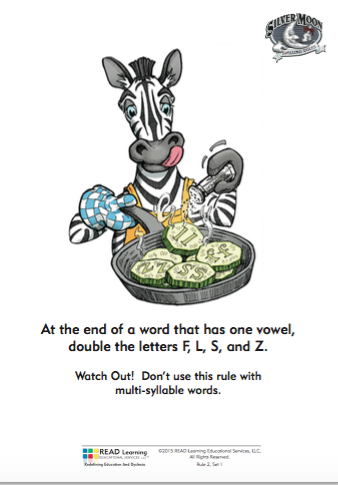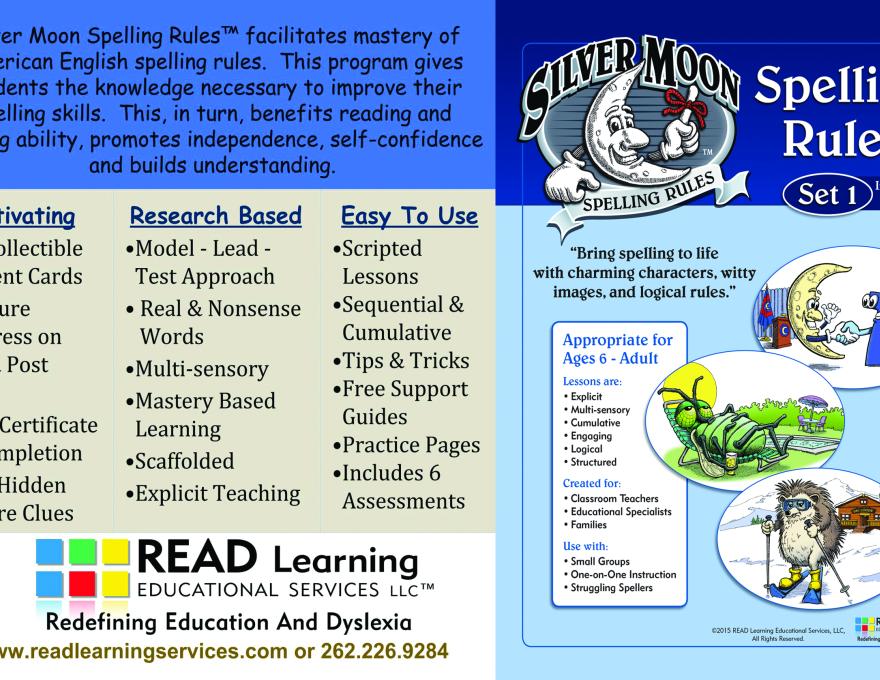Do you have a student or child who spells everything phonetically, adds extra sounds, skips vowels, overuses silent “e”, is confused about suffixes, or mixes up the order of letters within words? When working with children who struggle to spell, there are methodologies that work and those that don’t. Continue reading to find out what research has proven is best practice when teaching struggling spellers.
Why do some people struggle with spelling while others don’t?
Two of the most common reasons for poor spelling are dyslexia and dysgraphia. Both of these learning disabilities can affect spelling in a big way. The main difference between the two is that dyslexia primarily affects reading whereas dysgraphia affects writing. Both can have an impact on spelling ability.
The truth is, most people will learn to spell without much trouble. The typical routine is - study a list of words for a weekly test, complete the spelling activities, pass the test, and retain the words. Additionally, most people can spell sight words with a high level of accuracy. Sight words are usually memorized easily because they are used and seen with a high level of frequency.
This is not the case for struggling spellers. In fact, spelling can be a dreaded subject and is often the cause for anxiety and tears. It’s typical for struggling spellers to study hours for a test, complete all the activities and required workbook pages, and then study some more. Sometimes the student passes the test, but won’t remember how to spell any of the words a day later. Other times they don’t pass the test. Without long-term learning (learning that sticks and builds understanding) all of the studying, anxiety, and disappointment is not worth the time and effort. So, what do you do? Many parents will retire the programming they were using and try a new spelling program. If the new program still doesn’t work, they’ll try another program, hoping to find a good fit. Most teachers (in a classroom setting) will be content with the fact that some students are just not good spellers and continue using the same programming but try to add different activities to strengthen memory. It is frustrating when new activities and hard work don’t produce results. When it comes to struggling spellers, sheer effort alone will not improve spelling. It will take the right combination of content and presentation.
I’ve used several different spelling programs. Why haven’t they worked?
If you have tried spelling program after spelling program with no real success, then you know first hand that not all programs work for all types of spellers. The English language has a lot of rules and the rules have a lot of exceptions. Many spelling programs ask students to search for patterns within words. These patterns can be very abstract for struggling spellers because generally the reason for the pattern (the spelling rule) isn’t explained. Some examples include: CVC, CCVC, CVCe, CVCC, etc. These are confusing for struggling spellers because merely identifying a pattern does not build understanding. Instead this promotes memorization and confusion. Struggling spellers do not learn to spell simply by memorizing, like many of their peers do. Other times, spelling programs present too much information at one time. The long “I” sound can be spelled several different ways depending on the word it’s in. If all of these patterns are introduced at the same time it will confuse the student because it’s too much information to master at once.
If you search spelling rules online, you will find a lot of resources and programs. But, which resources are the best, most reliable, and accurate? Even if you have that determined, what is the best way to present/teach a rule based system of spelling? It’s one thing to have the content that needs to be taught. It’s a completely different skill to teach the material in a way that builds understanding and allows students to learn without become confused or overwhelmed.
Not all spelling programs are created equal. Here are 7 key components to look for when considering spelling material for struggling spellers.
7 Key Components in Research Based Spelling Programs
1. Rule Based
Most people don’t realize that only 4% of American English words are truly irregular and have to be learned through whole-word methods such as memorizing. Building understanding through applying spelling rules takes away the need to rely on memorization to spell words.
Secondly, memory can be an area of trouble with students who have learning disabilities. This means relying on memory presents an even bigger disadvantage to the struggling speller. Select a program that clearly teaches spelling rules, provides a lot of practice applying the spelling rules, and presents the rules in a logical sequence. It can be very confusing and defeating for students to practice spelling rules on words that contain additional spelling rules that they have not yet learned.
2. Cumulative
Learning objectives should be presented in a logical order beginning with the most basic words, concepts, and rules. Each lesson should build off previously mastered material and progressively become more complex. It is necessary for lessons to provide review and use a controlled word list so students are not presented with rules that haven’t been taught.
3. Engaging
Struggling spellers are not passive learners. They will not learn to become good spellers by working independently on activities in workbooks or worksheets. They need a high level of student to teacher interaction so they are actively engaged in learning. Often times the most engaging programs are explicit or direct instruction programs. These are scripted programs that are easy to facilitate even if you don’t have a background in education.
4. Simultaneously Multi-sensory
Now a days many products and programs are labeled multi-sensory. Multi-sensory means you are using more than one of your senses (auditory, tactile/kinesthetic, visual) to do something. This is good practice, but the brain will remember information better when learning is paired with three or more senses at the same time. When this occurs it is called, “simultaneously multi-sensory”.
5. Structured
Students benefit from lesson plans with a consistent sequence that includes verbal and nonverbal cuing and prompting. A model-lead-test approach is a proven method when it comes to working with struggling learners. The teacher will model new skills, guide the students through applying the skills, then test to see if the skill has been learned and can be used independently.
6. Real and Nonsense Words
High quality spelling programs, spelling programs that are steeped in research on learning disabilities, include real words and nonsense words. Nonsense words are make-believe words that sound silly. This is important because the learner will not be able to spell nonsense words visually (does it look right?) or by memory. The instructor will know, without a doubt, if the learner understands the spelling rule/skill that has been taught.
7. Mastery Based
In math, students need to master basic addition before learning to multiply. In spelling, students need to master foundational spelling rules before moving onto more complex rules. There are rules for one-syllable words, but there are also spelling rules for two-syllable words and three syllable words. Never assume students will master learning targets without direct instruction and never push a student through a program thinking they’ll get it eventually. Build a strong foundation of skills so that other learning can take hold.
Does spelling really matter?
Poor spelling should not be ignored. Spelling directly correlates to reading and writing skills. Spelling also affects confidence and the ability to communicate clearly. Save time, money, and frustration by looking for these seven key components in the spelling materials for your struggling speller.
The pictures below offer examples of American English spelling rules from the Silver Moon Spelling Rules Program. This research based and logical program brings spelling rules to life. It gives each rule a catchy name and pairs it with creative characters, and witty images. A sample lesson can be requested at: www.readlearningservices.com.


.png)

Kelly Steinke, M.A. Ed., NBCT is the founder of READ Learning Educational Services, LLC. Kelly taught special education, primarily to students with learning disabilities, for over 15 years in the Midwest, East Coast, and Pacific Northwest. During this time she became a National Board Certified Teacher (NBCT) in Exceptional Needs, earned a Master of Arts Degree in Education (Administration and Leadership), and founded her company, READ Learning Educational Services, LLC. For the past six years, Kelly has served the community as a dyslexia specialist.
Web: www.readlearningservices.com
Phone: 262-226-9284
Email: Ksteinke@readlearningservices.com
If you would like to see a demonstration of phonemic awareness being taught, please email or call Kelly at READ Learning. She would be happy to coach you through these skills in order to help your student(s).
Why do some people struggle with spelling while others don’t?
Two of the most common reasons for poor spelling are dyslexia and dysgraphia. Both of these learning disabilities can affect spelling in a big way. The main difference between the two is that dyslexia primarily affects reading whereas dysgraphia affects writing. Both can have an impact on spelling ability.
The truth is, most people will learn to spell without much trouble. The typical routine is - study a list of words for a weekly test, complete the spelling activities, pass the test, and retain the words. Additionally, most people can spell sight words with a high level of accuracy. Sight words are usually memorized easily because they are used and seen with a high level of frequency.
This is not the case for struggling spellers. In fact, spelling can be a dreaded subject and is often the cause for anxiety and tears. It’s typical for struggling spellers to study hours for a test, complete all the activities and required workbook pages, and then study some more. Sometimes the student passes the test, but won’t remember how to spell any of the words a day later. Other times they don’t pass the test. Without long-term learning (learning that sticks and builds understanding) all of the studying, anxiety, and disappointment is not worth the time and effort. So, what do you do? Many parents will retire the programming they were using and try a new spelling program. If the new program still doesn’t work, they’ll try another program, hoping to find a good fit. Most teachers (in a classroom setting) will be content with the fact that some students are just not good spellers and continue using the same programming but try to add different activities to strengthen memory. It is frustrating when new activities and hard work don’t produce results. When it comes to struggling spellers, sheer effort alone will not improve spelling. It will take the right combination of content and presentation.
I’ve used several different spelling programs. Why haven’t they worked?
If you have tried spelling program after spelling program with no real success, then you know first hand that not all programs work for all types of spellers. The English language has a lot of rules and the rules have a lot of exceptions. Many spelling programs ask students to search for patterns within words. These patterns can be very abstract for struggling spellers because generally the reason for the pattern (the spelling rule) isn’t explained. Some examples include: CVC, CCVC, CVCe, CVCC, etc. These are confusing for struggling spellers because merely identifying a pattern does not build understanding. Instead this promotes memorization and confusion. Struggling spellers do not learn to spell simply by memorizing, like many of their peers do. Other times, spelling programs present too much information at one time. The long “I” sound can be spelled several different ways depending on the word it’s in. If all of these patterns are introduced at the same time it will confuse the student because it’s too much information to master at once.
If you search spelling rules online, you will find a lot of resources and programs. But, which resources are the best, most reliable, and accurate? Even if you have that determined, what is the best way to present/teach a rule based system of spelling? It’s one thing to have the content that needs to be taught. It’s a completely different skill to teach the material in a way that builds understanding and allows students to learn without become confused or overwhelmed.
Not all spelling programs are created equal. Here are 7 key components to look for when considering spelling material for struggling spellers.
7 Key Components in Research Based Spelling Programs
1. Rule Based
Most people don’t realize that only 4% of American English words are truly irregular and have to be learned through whole-word methods such as memorizing. Building understanding through applying spelling rules takes away the need to rely on memorization to spell words.
Secondly, memory can be an area of trouble with students who have learning disabilities. This means relying on memory presents an even bigger disadvantage to the struggling speller. Select a program that clearly teaches spelling rules, provides a lot of practice applying the spelling rules, and presents the rules in a logical sequence. It can be very confusing and defeating for students to practice spelling rules on words that contain additional spelling rules that they have not yet learned.
2. Cumulative
Learning objectives should be presented in a logical order beginning with the most basic words, concepts, and rules. Each lesson should build off previously mastered material and progressively become more complex. It is necessary for lessons to provide review and use a controlled word list so students are not presented with rules that haven’t been taught.
3. Engaging
Struggling spellers are not passive learners. They will not learn to become good spellers by working independently on activities in workbooks or worksheets. They need a high level of student to teacher interaction so they are actively engaged in learning. Often times the most engaging programs are explicit or direct instruction programs. These are scripted programs that are easy to facilitate even if you don’t have a background in education.
4. Simultaneously Multi-sensory
Now a days many products and programs are labeled multi-sensory. Multi-sensory means you are using more than one of your senses (auditory, tactile/kinesthetic, visual) to do something. This is good practice, but the brain will remember information better when learning is paired with three or more senses at the same time. When this occurs it is called, “simultaneously multi-sensory”.
5. Structured
Students benefit from lesson plans with a consistent sequence that includes verbal and nonverbal cuing and prompting. A model-lead-test approach is a proven method when it comes to working with struggling learners. The teacher will model new skills, guide the students through applying the skills, then test to see if the skill has been learned and can be used independently.
6. Real and Nonsense Words
High quality spelling programs, spelling programs that are steeped in research on learning disabilities, include real words and nonsense words. Nonsense words are make-believe words that sound silly. This is important because the learner will not be able to spell nonsense words visually (does it look right?) or by memory. The instructor will know, without a doubt, if the learner understands the spelling rule/skill that has been taught.
7. Mastery Based
In math, students need to master basic addition before learning to multiply. In spelling, students need to master foundational spelling rules before moving onto more complex rules. There are rules for one-syllable words, but there are also spelling rules for two-syllable words and three syllable words. Never assume students will master learning targets without direct instruction and never push a student through a program thinking they’ll get it eventually. Build a strong foundation of skills so that other learning can take hold.
Does spelling really matter?
Poor spelling should not be ignored. Spelling directly correlates to reading and writing skills. Spelling also affects confidence and the ability to communicate clearly. Save time, money, and frustration by looking for these seven key components in the spelling materials for your struggling speller.
The pictures below offer examples of American English spelling rules from the Silver Moon Spelling Rules Program. This research based and logical program brings spelling rules to life. It gives each rule a catchy name and pairs it with creative characters, and witty images. A sample lesson can be requested at: www.readlearningservices.com.


.png)

Kelly Steinke, M.A. Ed., NBCT is the founder of READ Learning Educational Services, LLC. Kelly taught special education, primarily to students with learning disabilities, for over 15 years in the Midwest, East Coast, and Pacific Northwest. During this time she became a National Board Certified Teacher (NBCT) in Exceptional Needs, earned a Master of Arts Degree in Education (Administration and Leadership), and founded her company, READ Learning Educational Services, LLC. For the past six years, Kelly has served the community as a dyslexia specialist.
Web: www.readlearningservices.com
Phone: 262-226-9284
Email: Ksteinke@readlearningservices.com
If you would like to see a demonstration of phonemic awareness being taught, please email or call Kelly at READ Learning. She would be happy to coach you through these skills in order to help your student(s).






